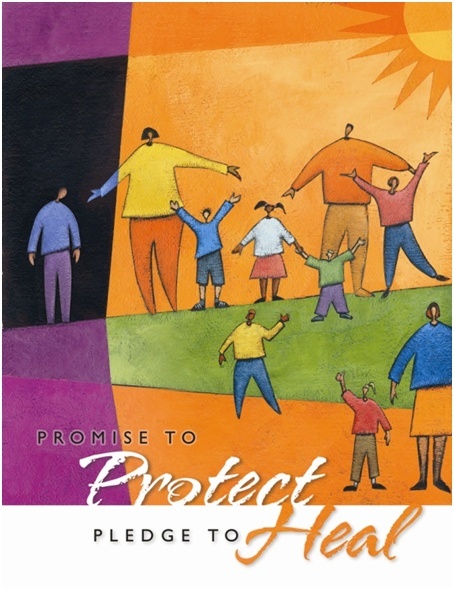
'But Mommy, this is very important!'
Monday, April 28, 2014
*Jan Rayburn
When my children were in grade school -- wasn’t that just yesterday? -- every Friday they would bring home a communication folder containing any information their school needed to give the parents. One side of the folder would hold information from the principal’s office, such as entries for raffle tickets or gift wrap sales. The other side would hold items from the classroom, such as graded tests, with their gold stars or smiling faces, and sometimes even a field trip permission form. I especially looked forward to the weeks that the folder contained their art projects or school pictures.

I was encouraged to hear that even before the lesson took place, her teacher was able to communicate the significance of these classes.
Teaching Touching Safety lessons are one component of the Virtus programs. Nearly all of us know of the Virtus “Protecting God’s Children” session for adults. It is a child abuse awareness and prevention program that is required of all clergy and employees, as well as all volunteers with access to children or vulnerable adults. It is a significant part of the Archdiocese of Miami’s “Promise to Protect and Pledge to Heal,” in keeping with the U.S. bishops’ Charter for the Protection of Children and Young People. Training adults is a tremendous commitment and paramount toward addressing the epidemic of child sex abuse. However, to come full circle and strive to change the culture of this crime, we must also train the children. In a classroom setting, where children learn fire safety, traffic safety and even water safety, they also learn personal safety.
Teaching Touching Safety consists of 10 lessons taught in age appropriate lesson plans. Each year, a class is presented at least two lessons. For example, the first year students are taught lessons one and two, and the next year lessons three and four. The program continues in this manner until all lessons have been taught. Then the process starts over with lessons one and two in the upgraded, age-appropriate lesson plan. By the time a student has rotated through all the lessons they have learned to understand safety rules, identify safe adults, and recognize boundaries, including Internet safety.
Children also learn about grooming techniques and the importance of telling someone they trust when there is an issue that makes them uncomfortable. These are just some of the objectives of the lesson plans. In their totality, they represent a true and solid presentation of facts on a topic that is riddled with misconception, as is any subject that has traditionally been taboo. This is vital, as predators thrive on the misconceptions or gray areas. The program is most effective when the lessons learned at school work in tandem with parents at home.
A collaborative and cohesive message at home strengthens the program and the safety net around our children. Parents can pick up an "Overview and Founding Principles of the TTS Program" and even a "Guidebook for Parents and Guardians and Other Caring Adults" from their parish or school’s Local Coordinator. Additionally, those adults with active Virtus accounts receive monthly bulletins that offer timely and topical information, which can spark ongoing communication with children.
A key contributor to the bulletins and all the Virtus materials is Dr. David Finkelhor, director of the Crimes Against Children Research Center. He writes, “There is broad agreement that the burden of preventing victimization should not lie exclusively in the hands of children. However, if there are potentially effective things that children can do, it would also be morally reprehensible not to equip them with such skills.”
She may not be an expert yet, but even my colleague’s daughter knows: “This is very important!”


Comments from readers